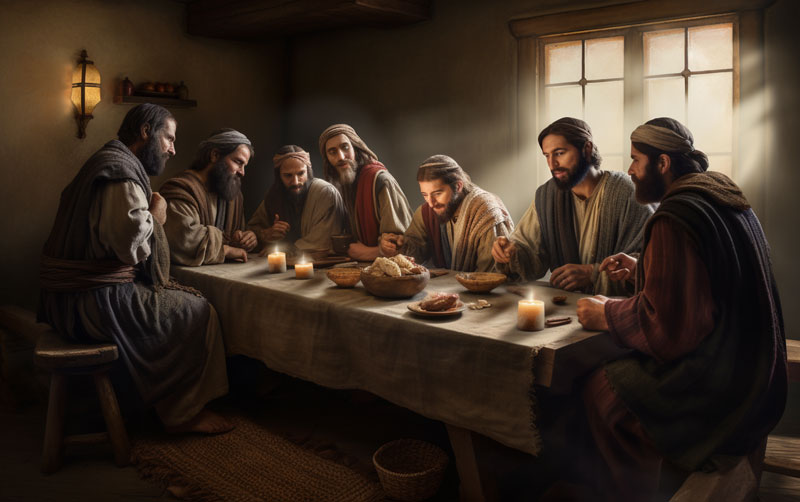The Importance of Breaking Bread

Throughout the Book of Acts, we find numerous references to the apostles breaking bread together. This seemingly simple act carries profound spiritual meaning and importance, which we will explore together today.
We'll begin our journey in Acts 2:42, which tells us about the early believers who were steadfast in devoting themselves to the apostles' teaching, to the fellowship, to the breaking of bread, and to prayer. Now, why was breaking bread so important to the early church? It's not just about sharing a meal, my friends. It's about the sense of unity and connection that is built around a shared table, where we come together to nourish our bodies, minds, and souls.
This unity can be seen in Acts 2:44-46, where we read that all the believers were together and had everything in common. They sold property and possessions to give to anyone who had need. Every day they continued to meet together in the temple courts, and they broke bread in their homes and ate together with glad and sincere hearts. How beautiful and heartwarming this image is! These early believers understood the importance of community and the power of sharing meals to strengthen bonds.
We can see another example of breaking bread in Acts 20:7, where we read about the believers who had come together on the first day of the week to break bread. Here, we find the apostle Paul talking to the people until midnight. The breaking of bread is once again central to the gathering of believers, illustrating the deep spiritual connections that are formed when we come together to share a meal.
As we explore the Book of Acts, we see that the act of breaking bread often went hand in hand with the sharing of the gospel. Take, for example, Acts 27:33-36. In this passage, we read about a stormy voyage where the apostle Paul and his companions found themselves on a ship threatened by the forces of nature. Paul urged everyone on board to take some food, saying, "This is for your survival, since not a hair from the head of any of you will perish." After he said this, Paul took bread, gave thanks to God in front of them all, broke it, and began to eat. The people on board were encouraged and also ate some food themselves.
In this instance, breaking bread served as a powerful reminder of God's presence and provision, even in the midst of life's storms. The act of breaking bread in thanksgiving to God not only provided physical nourishment but also offered spiritual sustenance and hope to the weary travelers.
But what does breaking bread mean for us today, dear friends? How can we apply the lessons we learn from the apostles in the Book of Acts to our own lives and communities?
First and foremost, breaking bread with one another is an opportunity to build connections and foster a sense of belonging. When we share a meal together, we create space for conversations and the exchange of stories, allowing us to know and understand one another on a deeper level. In a world where so many people feel lonely and disconnected, breaking bread together can help us bridge the gaps that divide us.
Moreover, the act of breaking bread can serve as a reminder of the spiritual nourishment that comes from fellowship with one another and with God. Just as the early believers devoted themselves to the apostles' teaching, to the fellowship, and to the breaking of bread, we too can find strength and sustenance in coming together around a shared table.
Breaking bread also calls us to practice radical hospitality, opening our homes and hearts to those in need. As we saw in Acts 2:44-46, the early believers shared their possessions and resources with one another, ensuring that everyone's needs were met. In this same spirit, we can open our doors to neighbors, friends, and even strangers, embodying the love and generosity that Jesus modeled for us.
In addition, breaking bread together can serve as a powerful reminder of the Lord's Supper, when Jesus broke bread with His disciples and shared the cup, symbolizing His body and blood that were to be given for us. As we break bread with one another, we can remember Christ's sacrifice, giving thanks for the redemption and new life that we have in Him.
Lastly, let us not forget the importance of prayer and thanksgiving when we gather to break bread. As we saw in Acts 27:33-36, the apostle Paul gave thanks to God for the food they shared even in the midst of a harrowing storm. This simple act of gratitude can inspire hope and faith in our own lives, reminding us of God's unwavering presence and provision.
In conclusion, let us take to heart the lessons we've learned from the apostles in the Book of Acts. As we break bread together, let us remember the deep spiritual connections that can be formed through fellowship, the importance of practicing radical hospitality, and the significance of prayer and thanksgiving.
May our gatherings around shared meals be a source of nourishment for our bodies, minds, and souls, and may we continually be reminded of the love, unity, and hope that we have in Christ. Amen.


